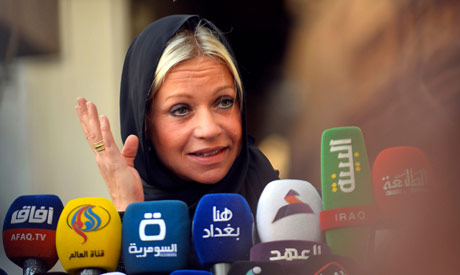
Jeanine Hennis-Plasschaert, UN Special Representative for Iraq and Head of the United Nations Assistance Mission for Iraq (UNAMI), speaks during a press conference following a meeting with Iraqi Shiite cleric Grand Ayatollah Ali al-Sistani in Iraq's holy city of Najaf on November 11, 2019. (Photo: AFP)
Iraq's top Shia cleric is concerned the political elite is not serious about enacting promised reforms to defuse mass unrest and believes protesters will not go home without concrete steps to realize their demands, a senior U.N. official said.
More than 280 people have been killed in protests that erupted in Baghdad on Oct. 1 and spread to the southern Shia heartland, seeking an overhaul of a corruption-ridden sectarian political system, more jobs and functioning public services.
The government has been unable to find an answer to the unrest pitting the political class against mostly unemployed young people who see no improvement in their lives even in peacetime after decades of war and sanctions.
Shi Grand Ayatollah Ali al-Sistani, who only speaks on politics in times of crisis and wields enormous influence over public opinion in Shi'ite-majority Iraq, on Monday met Jeanine Hennis-Plasschaert, the U.N. mission chief in the country.
"(Sistani) made it clear (he) supports the conduct of serious reforms in a reasonable period of time," Hennis-Plasschaert told a news conference after the meeting in the Shi'ite holy city of Najaf.
She said Sistani had welcomed reform recommendations presented to him by the U.N. Assistance Mission in Iraq (UNAMI).
These include a release of all detained peaceful protesters, investigations into killings of protesters, declarations of assets by political leaders to address graft accusations, corruption trials, electoral reforms and constitutional changes to make leaders more accountable within the next three months.
"(Sistani) also expressed (his) concern that the political forces are not serious enough to conduct these reforms," she said. "Additionally, (he) stresses that the demonstrators cannot go home without sufficient results."
The unrest is the biggest and most complex challenge in years to the political order set up after a U.S.-led invasion that toppled dictator Saddam Hussein in 2003.
Government handouts for the poor, pledges to prosecute corrupt officials and create more jobs for graduates have failed to placate protesters, whose demands include a new electoral system and the removal of all current leaders.
Security forces have used live ammunition, tear gas and stun grenades against mostly young and unarmed protesters.
Washington also welcomed the UNAMI plan.
"The United States joins the U.N. Assistance Mission to Iraq in calling on the Iraqi government to halt the violence against protesters and fulfil President (Barham) Salih's promise to pass electoral reform and hold early elections," the White House press secretary said in a statement.
Iraqi leaders agreed on Sunday that electoral reforms should give more chance for young people to participate in politics and break the monopoly on power of political parties that have dominated state institutions since 2003.
Short link: